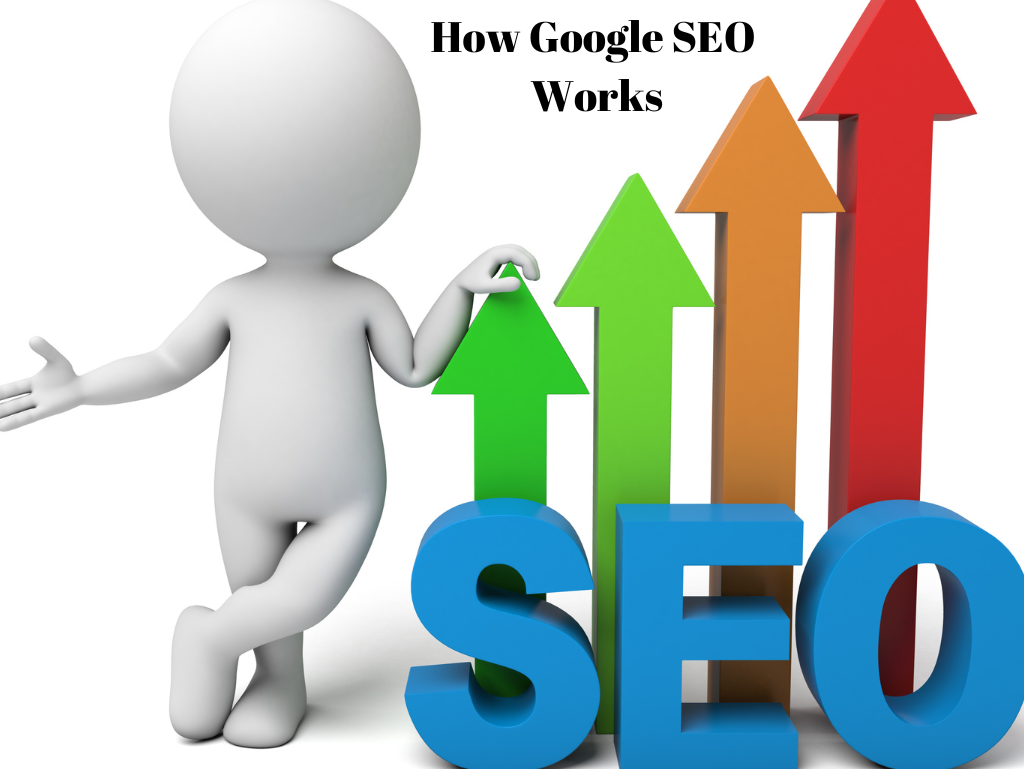If you are looking for How Google SEO Works .In the digital age how does seo works, where information is just a click away, the importance of Search Engine Optimization (SEO) cannot be overstated.
SEO is the art and science of enhancing a webpage’s exposure on search engines similar to Google. But exactly does How Google SEO works? This article will unravel the intricacies of Google’s SEO mechanisms, providing a clear understanding of optimizing your content for better search engine rankings.

Understanding Google’s Algorithm
At the heart of Google’s SEO is how search engine optimization works its complex algorithm, which determines the relevance and ranking of web pages.
Google’s online search engine optimization algorithm considers hundreds of factors when evaluating a web page. These factors are constantly evolving, but some of the core elements include:
Keywords
Keywords are the words and phrases that people enter into the search field; online search engine optimization. How Google SEO works evaluates your website’s content to see how well it fits the search query.
How does search engine optimization work SEO performance depends on conducting thorough keyword research and integrating it into your content.
Content Quality:
Google prioritizes high-quality, relevant, and engaging content. This means that your content should be informative, well-written, and provide value to the reader. Google uses various metrics to assess content quality, including dwell time, bounce rate, and user engagement.
Links back to the page
Backlinks are connections to your website created by other websites; they are also known as inbound links. Google interprets backlinks as an endorsement of your content, indicating its authority and trustworthiness. Backlink volume and quality can have a big impact on your search engine rankings.
Mobile-Friendliness:
Google is moving towards mobile-first indexing in response to the growing usage of mobile devices. This indicates that Google indexes and ranks your website mostly using its mobile version. SEO requires that your website be responsive to mobile devices.
Page Speed:
Another important consideration is how quickly your webpages load. Pages that load slowly can cause users to have a bad experience and increase in bounce rates.
As a ranking criteria, Because Google looks at page speed, How Google seo works performance optimization is crucial for any website.
User Experience (UX):
To keep users on your website longer, you need to provide a good user experience. This consists of pertinent material, a tidy layout, and simple navigation.
Google uses a number of indications, including click-through rates and amount of time spent on the website to evaluate user experience (UX).

The Role of On-Page and Off-Page SEO
There are two primary areas of SEO: on-page and off-page. SEO. Both play a vital role in improving your website’s search engine rankings.
Page-by-Page SEO
enhancing each individual webpage to improve its ranking and attract more relevant traffic is known as on-page SEO. Important on-page SEO techniques consist of:
Title Tags and Meta Descriptions:
Creating captivating and keyword-rich meta descriptions and title tags can assist search engines comprehend the content of your pages and entice visitors to visit your website.
Header Tags:
It is easier for search engines to crawl and comprehend your page if you use header tags (H1, H2, H3) to organize your material. It also makes content easier for users to read.
Image Optimization:
Optimizing images with alt text and descriptive file names can improve accessibility and drive traffic from picture searches.
Internal Connection:
Establishing a clear site structure and assisting search engines in finding more of your material are two benefits of linking to other pertinent pages on your website.
Off-Page SEO:
The term “off-page SEO” describes activities you perform off your website to influence your search engine ranking. Important off-page SEO techniques consist of.
Creating Links
It’s critical to obtain backlinks of the highest caliber from reliable websites. Collaborations, shareable content, and guest writing can help achieve this.
Marketing on Social Media:
Social networking platform promotion of your content can enhance traffic and the chance of obtaining backlinks.

Brand Mentions:
Mentions of your brand, even without a direct link, How Google seo works can positively influence your search rankings as they contribute to your site’s authority and relevance.
Staying Ahead with SEO Trends
SEO is not a static field; it evolves with changes in technology and user behavior. keeping abreast of the most recent algorithms and developments in SEO .
updates are essential for maintaining and improving your search rankings. Here are a few trends to keep an eye on:
Voice Search Optimization:
With the rise of voice assistants like Siri and Alexa, voice search optimization is becoming increasingly important. This involves focusing on natural language queries and long-tail keywords.
Artificial Intelligence (AI ):
AI plays a more significant role in SEO, with tools like Google’s RankBrain helping better understand user queries and deliver relevant results. Embracing AI-driven SEO strategies can give you an edge.
Core Web Vitals:
Google’s Core Web Vitals, which assesses user experience based on loading speed, interactivity, and visual stability, is becoming a critical ranking factor. Ensuring your site meets these metrics is vital.
Conclusion
Understanding how Google SEO works is the first step towards creating a successful online presence. By focusing on critical elements like keywords, content quality, backlinks, and user experience and staying updated with evolving trends, you can optimize your website to rank higher in search results.
SEO is a long-term investment, but with persistence and strategic efforts, it can lead to significant rewards in terms of traffic, visibility, and growth for your business or brand.

FAQ:
What is SEO?
The practice of how google seo work and search engine rating onSearch engine optimisation, or SEO, is the process of creating search engine results pages, or SERPs. enhancing a website’s exposure and SERPs, or search engine ranking.This entails applying a variety of methods and approaches to improve the user experience, relevance, and credibility of the website.
How does Google’s algorithm work?
The algorithm used by Google is a sophisticated system that assesses hundreds of variables to rank and determine the relevancy of web pages. Keywords, backlinks, mobile friendliness, page speed, and user experience are important variables. To increase the precision of search results, the algorithm is updated frequently.
What are keywords, and why are they important?
The terms and expressions individuals type into search engines are known as keywords. Because they assist Google in deciphering the content of your pages and associating them with pertinent search queries, they are essential to SEO. Optimizing your website’s keyword research and usage can greatly increase its visibility.
What distinguishes off-page SEO from on-page SEO?
On-page SEO involves optimizing elements on your website, such as title tags, meta descriptions, header tags, image alt text, and internal links. Off-page SEO focuses on external factors, like acquiring high-quality backlinks, social media marketing, and brand mentions, to enhance your site’s authority and relevance.
How do backlinks affect SEO?
Google views backlinks as endorsements of your content’s credibility and quality. High-quality backlinks from reputable sites can improve your search rankings, while low-quality or spammy links can harm your SEO.
Why is mobile-friendliness important for SEO?
Since mobile devices are the primary means of internet access for most consumers, Google uses mobile-first indexing, which means it indexes and ranks your website primarily based on its mobile version. Having a mobile-friendly website offers two advantages: improved user experience and higher search engine ranking.
How does page speed impact SEO?
Page speed is one of the major ranking considerations. due to it affects user experience. Slow-loading websites may see a rise in bounce rates and a decline in user interaction. Enhancing the loading speed of your website can increase user satisfaction and improve search engine results.
What role does user experience (UX) play in SEO?
SEO requires a satisfying user experience. Google uses metrics like bounce rates, time spent on the site, and click-through rates to assess user experience. A well-organized, user-friendlyIntelligent content on your website keeps users engaged and signals to Google that your website is worthy of a higher ranking.
How can I optimize my content for voice search?
Voice search optimization focuses on natural language queries and long-tail keywords, as users often use conversational language when speaking to voice assistants.Answers to frequently asked queries that are clear and useful will improve your content’s voice search ranking.
What are Core Web Vitals, and why are they important?
A collection of metrics called Core Web Vitals evaluates the user experience by looking at things like visual stability (Cumulative Layout Change), engagement (First Input Delay), and loading velocity (Biggest Contentful Paint). These metrics are critical ranking factors, and optimizing your site to meet them can improve your SEO.
How often does Google update its algorithm?
Google adjusts its algorithm often in an effort to improve the quality of search results. Certain modifications are small, but others have a big effect on search ranks. Maintaining and enhancing the functionality of your website relies on updating your SEO strategies in light of these advancement.
How long does it take to see results from SEO efforts?
Since SEO is a long-term approach, noticeable results may not be seen for several months. The length of time varies according to variables such as competition, the state of your website at the moment, and the success of your SEO tactics. To get and keep high rankings, one must be patient and work consistently.
What tools can help with SEO?
Numerous tools are available to assist with SEO, including Google Analytics, Google Search Console, Ahrefs, SEMrush, Moz, and Yoast SEO. These tools help with keyword research, performance tracking, backlink analysis, and optimizing your content and site structure.
Can I do SEO alone, or should I hire a professional?
While basic SEO can be done independently with the help of online resources and tools, hiring an SEO professional or agency can provide expert insights and advanced strategies. For complex or competitive industries, professional SEO services can be particularly beneficial.
How do I stay updated with the latest SEO trends and changes?
Staying updated with SEO trends involves:
- Following industry blogs.
- Participating in forums.
- Attending webinars and conferences.
- Subscribing to updates from Google and other reputable SEO resources.
Continuous learning and adaptation are essential for successful SEO.You may better manage the complexities of search engine optimisation and enhance the performance and exposure of your website by comprehending these core elements of Google SEO.


Add a Comment